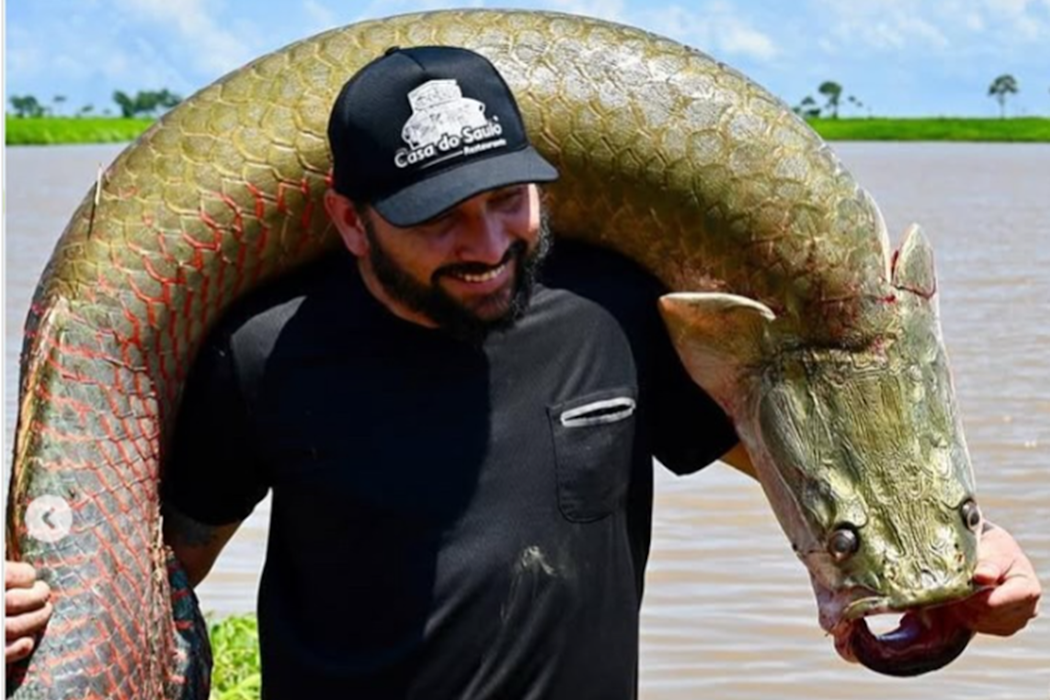
Saulo Jennings, an acclaimed Amazonian chef and UN gastronomy tourism ambassador, was reportedly outraged when organisers of Prince William’s Earthshot prize asked him to prepare an entirely vegan menu. For Jennings, being told to exclude pirarucu – the region’s iconic giant freshwater fish – was not merely a matter of preference but a lack of respect for his culinary traditions.
Prince William founded the Earthshot prize to celebrate innovative solutions to the planet’s greatest environmental challenges. This year’s ceremony takes place on November 5 at Rio de Janeiro’s futuristic Museu do Amanhã (Museum of Tomorrow), marking the first time the Earthshot’s award ceremony will be held in Latin America. It will serve as the opening act for Cop30, which begins on November 10 in Belém, in the heart of the Amazon, emphasising the region’s central place in climate discussions.
Jennings had agreed to create a selection of canapes for the awards ceremony, which was when the misunderstanding arose. He designed a menu with a vegan option but was then told the whole selection must be vegan, meaning he couldn’t include any dishes featuring pirarucu. “It was like asking Iron Maiden to play jazz,” he told the New York Times. “It was a lack of respect for local cuisine, for our culinary tradition.”
At the museum’s urging, Jennings agreed to design an Amazonian-inspired vegan menu using native ingredients. But by then the deal had collapsed and another team was selected to feed the awards ceremony.
Instead, Jennings has been commissioned to cook for the Norwegian and Chinese delegations at Cop30, and will also oversee the food for the Cop banquet, prepared for the heads of state attending the conference. For these occasions, he will be able to highlight the Amazon’s diverse flavours and, he has respectfully assured, will be serving pirarucu.
By insisting on a vegan menu, the Earthshot prize effectively equated veganism with sustainability. But while the two concepts can overlap, they are not the same. Some vegan foods, such as avocados, have large carbon footprints.
This is just one example of how well-intentioned western environmental initiatives can unintentionally clash with the values and food practices of the communities they aim to celebrate.
Impositions on sustainable food practices
Western impositions on Indigenous food cultures stretch back to colonial times. Early European settlers viewed their own staple crops, such as wheat and barley, as symbols of civilisation. On the other hand, they often dismissed Indigenous foods like Andean grains such as quinoa and amaranth as “primitive”.
This legacy still shapes food hierarchies today. In Peru, for example, communities in the Andes are swapping traditional potatoes for pasta and rice.
Nowadays, consumers – both in Brazil and globally – play a role in reinforcing western ideas through their purchasing choices and perceptions of “authentic”, “exotic” or “healthy” foods that shape the exchange of foods across different countries and market segments, while distorting local economies and traditions.
In Belém, açaí berries are a staple of local culinary custom, traditionally consumed by residents with manioc flour and fish. But in other Brazilian regions – and increasingly internationally – they have become known as a trendy powdered or frozen “superfood”, or are blended into açaí bowls.
In postcolonial nations, local elites – typically composed of non-Indigenous people who have historically aligned themselves with western tastes and values – can sometimes both reinforce and challenge these inequalities
In Brazil’s culinary scene, elite chefs have taken the lead in defining a new national haute cuisine that elevates Amazonian ingredients through fine-dining techniques. For example, renowned Brazilian chef Alex Atala elevates pirarucu by reinterpreting the fish using innovative techniques and presentations at his Sao Paulo restaurant, D.O.M.
However, this can detach ingredients from their original uses and create pressures on producers to deliver more, which could lead to unsustainable practices. Therefore, Atala is also committed to advancing sustainability, research and cultural preservation through Instituto Ata, which aims to showcase the diversity both of Brazil’s culture and its environment.
For Indigenous chef Tainá Marajoara, there’s a risk that elite Brazilian culture is borrowing heavily from Indigenous traditions – and using Amazonian ingredients without properly acknowledging the debt this modern food owes to the cultures from which it has been appropriated.
Marajoara – like Jennings, a UN ambassador for gastronomy – has sharply criticised what she perceives as the dominant mindset among Brazilian chefs. She told food magazine Saveur that some elite chefs believe “the food of dark-skinned people needs to be updated, as though we don’t have a wisdom and aesthetic of our own”.
Decolonising western ideas about sustainability
Many Indigenous communities adopt a “kincentric” view of the natural world, meaning they see humans, plants and animals as interconnected members of a shared ecological family, rather than separate entities.
According to Jennings, sustainability means living in harmony with nature’s rhythms – not imposing uniform dietary rules. As he told the New York Times: “We eat whatever the forests give us, whatever the rivers give us. Some days we eat fish; other days we eat nuts and açaí. This is also sustainable.”
True sustainability requires cultural and ecological respect. At Cop30, Jennings and Marajoara will design menus grounded in their cultures’ deep relationships with the natural world. Their aim is to show that sustainability should be a lived practice, not just politicians’ rhetoric.
Hopefully, their participation will reinforce the important message that meaningful climate solutions depend on Indigenous leadership and knowledge.
Bridging the gap between western assumptions and local ecological realities remains urgent. Marajoara warns: “As long as ancestral lands are violated and violence spreads across forests, rivers and fields, our people and our culture are being killed.”
This article is republished from The Conversation, a nonprofit, independent news organization bringing you facts and trustworthy analysis to help you make sense of our complex world. It was written by: Belinda Zakrzewska, University of Birmingham; Flavia Cardoso, and Maria-Carolina Zanette, Neoma Business School
Read more:
- Peru’s gastronomic boom risks excluding the Indigenous people whose food it celebrates
- Vegan diet has just 30% of the environmental impact of a high-meat diet, major study finds
- Vegan food’s sustainability claims need to give the full picture
The authors do not work for, consult, own shares in or receive funding from any company or organisation that would benefit from this article, and have disclosed no relevant affiliations beyond their academic appointment.


 The Conversation
The Conversation
 CNN
CNN POPSUGAR
POPSUGAR FOX 5 Atlanta Crime
FOX 5 Atlanta Crime Democrat and Chronicle
Democrat and Chronicle Ocala Star-Banner
Ocala Star-Banner FOX 13 Tampa Bay Crime
FOX 13 Tampa Bay Crime 9&10 News
9&10 News People Shopping
People Shopping Iowa City Press-Citizen
Iowa City Press-Citizen HowStuffWorks Animals
HowStuffWorks Animals The List
The List